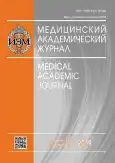NEUROIMMUNE MECHANISMS OF COGNITIVE IMPAIRMENT AT AFFECTIVE DISORDERS
- Authors: Goldin BG1,2
-
Affiliations:
- Federal State Budgetary Educational Institution of Higher Professional Education “Novosibirsk State Pedagogical University”, Novosibirsk
- Federal State Budgetary Educational Institution of Higher Education “Novosibirsk State Medical University”, Novosibirsk
- Issue: Vol 19, No 1S (2019)
- Pages: 76-78
- Section: Articles
- Published: 15.12.2019
- URL: https://journals.eco-vector.com/MAJ/article/view/19333
- ID: 19333
Cite item
Abstract
The aim of this study was the identification of the neuroimmune mechanisms of cognitive impairment on the basis of investigation of an of cognitive disorders association with functional activity of blood mononuclear cells and the synthesis of tumor necrosis factor - α (TNF-α) in patients with affective disorders in the form of depressive reactions and depression.TNF-α expression level in blood mononuclear cells of patients conducted with using the reverse transcriptase polymerase chain reaction method. The proliferative activity of blood mononuclear cells was investigated by a standard method based on the inclusion of a radioactive label. Cognitive function was assessed on the basis of perception, memory, praxis, speech, and control function. The severity of affective symptoms was measured by the Hamilton scale. It was found that patients with depressive reactions were characterized by the mild non-elemental cognitive impairment; while, in patients with depression, more severe non-elemental cognitive impairments in the form of decreased attention, memory, and daily activity were observed. In patients with affective disorders in the form of depression, an increase in the synthesis of TNF-α in blood mononuclear cells was detected, both an increase of the expression frequency of its gene and an increase in mRNA level, as well as an increase of the proliferative activity of blood mononuclear cells, which indicates the presence of immune system dysfunction in this category of patients.Thus, in patients with depression, activation of the TNF-α synthesis in blood mononuclear cells occurs: an increase in the frequency of its expression and an increase of the level of mRNA; these changes are accompanied by the increasing of immune cells functional activity and moderate non-delicate cognitive disorder in the form of cognitive impairment.
Full Text
About the authors
B G Goldin
Federal State Budgetary Educational Institution of Higher Professional Education “Novosibirsk State Pedagogical University”, Novosibirsk; Federal State Budgetary Educational Institution of Higher Education “Novosibirsk State Medical University”, Novosibirsk
References
- Khandaker GM, Cousins L, Deakin J, et al. Inflammation and immunity in schizophrenia: implications for pathophysiology and treatment. Lancet Psychiatry. 2015;2(3):258-270.
- Leboyer M, Berk M, Yolken RH, et al. Immuno-psychiatry: an agenda for clinical practice and innovative research. BMC Med. 2016;14:173. https://doi.org/10.1186/s12916-016-0712-5.
- Goldina IA, Markova EV. Neiroimmunnye mehanismy patogeneza rasseyannogo sclerosa. Krasnoyarsk: Nauchno-innovacionnyi centr; 2018. 150 p. (In Russ.). https://doi.org/10.12731/978-5-906314-89-5.
- Smagin AA, Goldina IA, Gaidul KV. Issledovanie proliferativnoi aktivnosti mononuclearnyh kletok krovi bolnyh rasseyannym sklerozom pri vozdeistvii peptida regiona envelope endogennogo retrovirusa cheloveka HERV-E λ 4-1. Medicinskaya immunologia. 2014;16(3):247-256. (In Russ.).
- Rozenblat JD, Levey D, Le-Niculescu H, et al. Psychiatric blood biomarkers: avoiding jumping to premature negative or positive conclusions. Mol. Psychiatry. 2015;20(3);286-288.
Supplementary files







